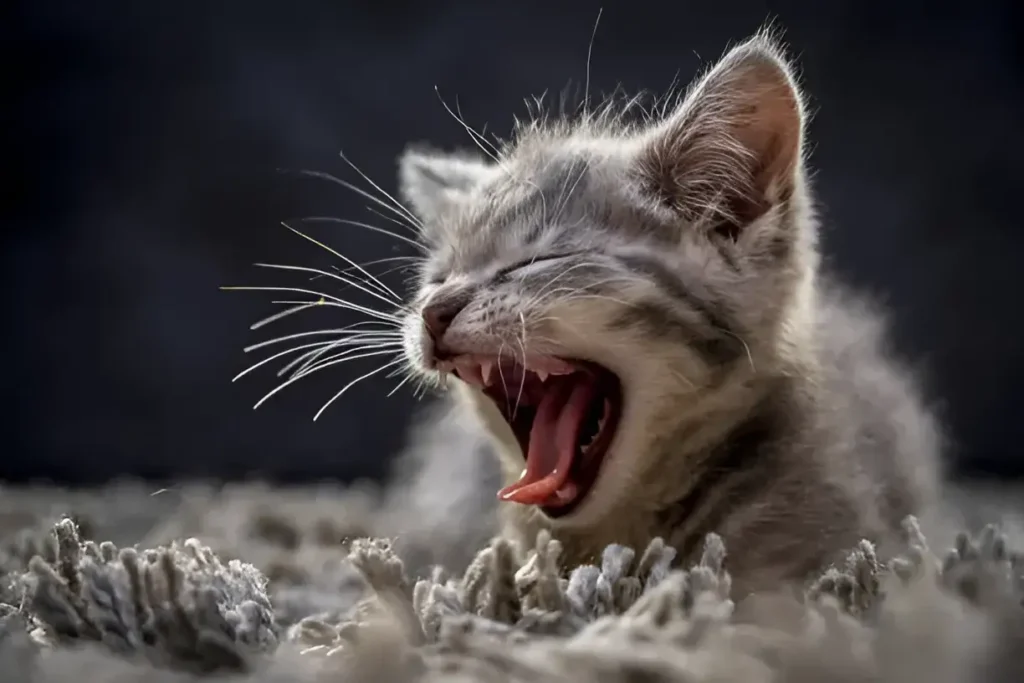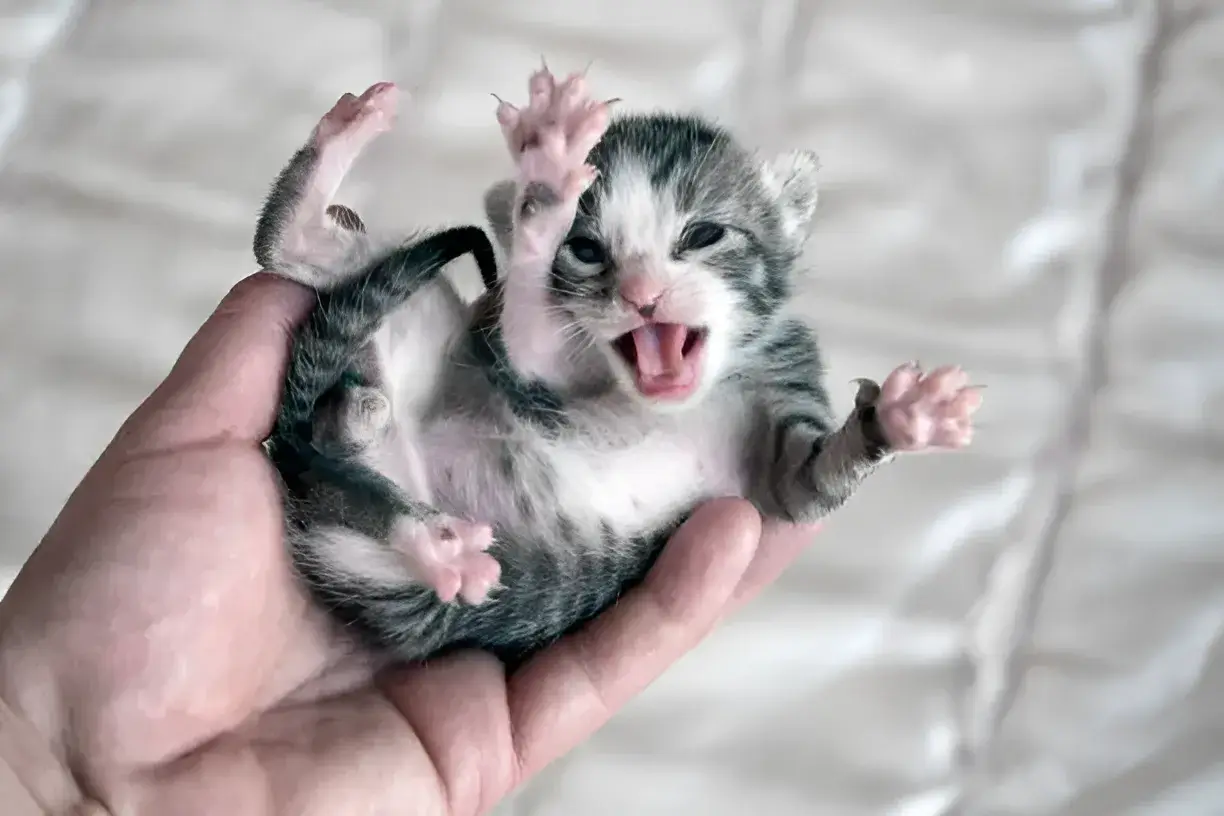Your kitten opens their mouth to meow, but no sound comes out. This is completely normal in some cases, but it can also raise concerns. Rest assured, there are many reasons why your kitten may be a silent companion. Let’s explore why your little feline friend might not be making those classic “meow” sounds.
Newborn Kittens: Whispers and Squeaks
Kittens enter the world with their eyes and ears closed. Their earliest communication relies on scent cues, gentle touches, and soft squeaking sounds. The classic “meow” develops as they grow, so be patient if your new kitten is on the quiet side!
Young Kittens: Learning to Vocalize (and Other Possibilities)
Just Getting Started: Kittens between 2-8 weeks are experimenting with vocalizations. You might hear chirps, squeaks, or weak meows. They’re still figuring it out!
Personality Trait: Some cats are naturally quieter than others. Your kitten may simply be less vocal by nature.
Minor Upper Respiratory Infection (URI): URIs, like a kitty cold, can cause slight hoarseness or congestion, affecting meows. Look for other signs like runny eyes or nose.
Developmental Variations: Sometimes, kittens have slightly delayed development in certain areas, including vocalization.
When Should You Be Concerned?
If your kitten is over 8 weeks old and remains consistently silent, a visit to the veterinarian is a wise decision. They can assess your kitten’s overall health and determine if any of these less common factors are present:
Laryngitis: Your kitten’s voice box (larynx) might be inflamed due to an infection or irritation, making meowing difficult.
Structural Differences: In rare cases, kittens may have slight anatomical variations in their vocal cords, influencing sound production.
Past Injury: If your kitten has experienced trauma to the throat or surrounding areas, this could affect their ability to vocalize.
Neurological Concerns: In very uncommon instances, neurological issues can impact a kitten’s ability to meow as intended.
Myths about Silent Kittens

Myth #1: Every Kitten Meows Loudly from Birth (False): Kittens are born with limited communication skills. Their vocalizations start as subtle squeaks and develop into meows over the first few weeks.
Myth #2: A Silent Kitten Always Indicates a Serious Problem (Not Necessarily True): Many reasons can explain a kitten’s silence, including age, personality, or minor health issues. A vet visit is recommended if the silence persists after 8 weeks.
Myth #3: You Can Force a Kitten to Meow (Unproductive): Forcing a meow isn’t helpful. Instead, create a positive and playful environment to encourage natural vocalization.
How to Understand Your Kitten’s Other Sounds
Purring Decoded: Explain the rumbling sensation, different purr types (rumbling, chattering), and their potential meanings (contentment, seeking attention, pain relief).
The Meaning Behind Chirps: Describe these high-pitched vocalizations often used by kittens when excited about play or seeing a bird outdoors.
Hissing and Growling: Briefly explain these defensive vocalizations, emphasizing the importance of recognizing them and providing space for the kitten if needed.
Glossary of Feline Vocalizations
- Meow: The classic feline sound, used for a variety of purposes.
- Yowling: Long, drawn-out vocalization, often expressing discomfort or loneliness.
- Chattering: Rapid teeth-clicking sound, sometimes made when a cat is excited about prey.
- Caterwauling: Loud, often unsettling vocalizations associated with mating behavior.
How to Encourage Your Kitten to Meow
- Playtime: Engage your kitten with toys that mimic prey. Excitement might elicit squeaks or meows.
- Positive Reinforcement: When you do hear a tiny meow, reward your kitten with gentle praise and a treat.
- Observe and Monitor: Pay attention to other vocalizations, body language, and overall health.
Conclusion
While a kitten’s silence can be puzzling, it often has a simple explanation. By understanding your kitten’s age, personality, and overall health, you’ll gain insights into their communication style. Remember, even the quietest kittens express themselves through body language, purrs, and other adorable ways!
The photo featured below the post headline is Credit: Paul Biris/gettyimages
I hope you find this post helpful and informative. If Yes’ feel free to share it with your friends!
Frequently Asked Question
My kitten makes a squeaking sound but no meow. Should I worry?
Probably not! Squeaks are part of a kitten’s developing vocal range. True meowing will likely come with time.
My kitten used to meow but has suddenly stopped. What should I do?
If a previously vocal kitten goes silent, it’s best to see a veterinarian. This change could signal illness or injury.
Could my silent kitten be deaf?
It’s possible, though less common. Veterinarians can perform tests to check your kitten’s hearing.
Is it normal for a kitten to not be able to meow?
Yes, it can be normal, especially for very young kittens or those with quieter personalities. However, if your kitten is older and persistently silent, a vet checkup is a good idea.
Why does no sound come out when my kitten meows?
There are several reasons, from being very young to minor colds to potential health concerns. Read the full article for details!
Is it bad if my cat can’t meow?
It depends. Some cats are simply less vocal. If your kitten never meowed, it might be normal for them. However, a sudden loss of a meow in a previously vocal cat could indicate a problem.
Why does my kitten squeak and not meow?
Kittens are still learning how to vocalize. Squeaks are a sign that they’re practicing their communication skills!
Why can my cat purr but not meow?
Purring and meowing use different mechanisms in a cat’s throat. Sometimes, illness or injury can specifically affect meowing while leaving purring intact.
Why can’t my kitten meow at night?
There’s no specific reason kittens wouldn’t meow at night. Are you noticing less vocalization at night compared to daytime? This could simply be a matter of energy levels or your kitten adjusting to your sleep schedule.
Why can’t my cat meow from birth?
Very young kittens often don’t meow. If your kitten remains silent past the first few weeks, it’s a good idea to schedule a veterinary checkup.
Why doesn’t a stray cat meow?
Stray cats might meow less due to stress, learned behavior (if meowing didn’t get them desired results in the past), or potential health issues affecting their vocalization.
Why can my kitten purr but not meow?
Kittens develop the ability to purr very early, even before they can open their eyes. Meowing comes a little later, so this is perfectly normal.
Why doesn’t my stray kitten meow?
Stray kittens might be quiet due to stress, being naturally less vocal, or potential health concerns. Offering food, water, and a safe space may help them relax, and a vet visit is recommended.
Is it normal for a specific breed of cat to not meow much?
Yes! Some breeds, like Persians, Chartreux, or Ragdolls, are known for their quieter nature.
My kitten stopped meowing after a vaccination – should I be worried?
Slight lethargy or voice changes can be temporary side effects after vaccinations. Monitor your kitten closely, and if the silence persists for more than a day or two, consult your veterinarian.

